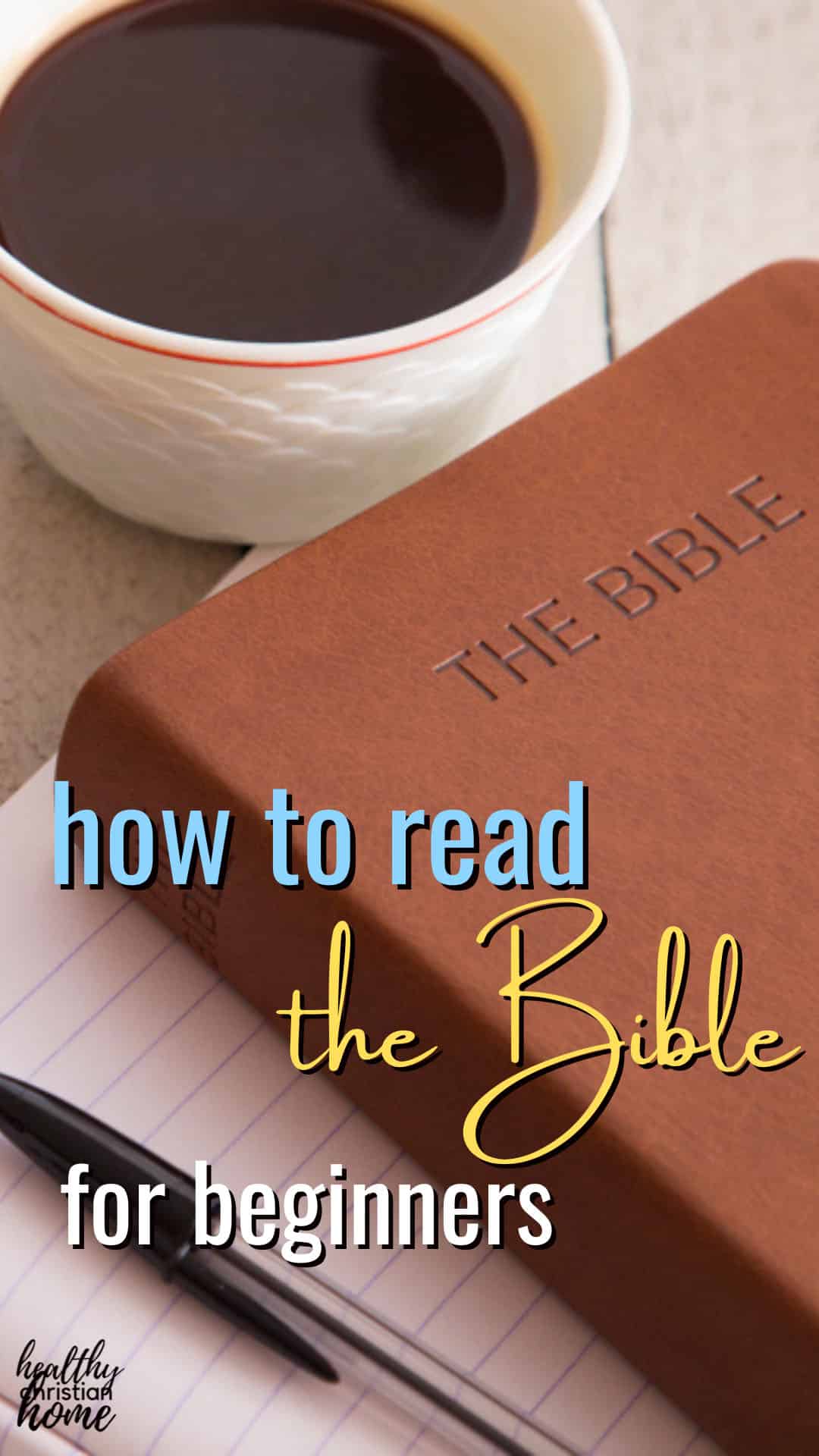Learn how to read the Bible step-by-step for beginners. Includes insights for getting the most out of Bible reading, an overview of the Bible, and a simple Bible reading plan.
How Should a Beginner Read the Bible?
It might seem like there is an obvious answer to this question. If you know how to read, and you own a Bible, just open it and start reading. Problem solved.
But of course, there is more to it, and there are a few keys that seriously help in reading the Bible and getting the most from its pages, whether you are a beginner or skilled. The better question might be, “What is the correct, or most efficient, way to read the Bible?”

4 Insights About How to Read the Bible for Beginners
Below are a few insights about reading the bible that might not be obvious at first, but will go a long way toward helping beginners on their quest to know God’s word.
Insight #1: Know the benefits of Bible reading
The Apostle Paul tells a young man named Timothy that the scriptures will make him wise concerning salvation. He explains where the scriptures come from, and how they equip us for every part of life.
“But as for you, continue in what you have learned and have firmly believed, knowing from whom you learned it and how from childhood you have been acquainted with the sacred writings, which are able to make you wise for salvation through faith in Christ Jesus. All Scripture is breathed out by God and profitable for teaching, for reproof, for correction, and for training in righteousness, that the man of God may be complete, equipped for every good work” (2 Timothy 3:14–17).
From this passage, the benefits of knowing God’s word are clearly stated: wisdom, correction, training, and readiness.
Insight #2: Understand the nature of the Bible
When I appreciate the benefits of reading the Bible, it is easy to guilt myself for not reading it enough. I might feel bad that I do not have the proper motivation for reading a book I am “supposed to read.” (For more on this topic, check out When You Aren’t Motivated to Read the Bible.)
Do you ever come to a point where you read a page of the Bible and think, “What did I just read?” Then, you start over again and try to pay attention.
At one time in my life, I did this often, thinking it was because I did not want to read the Bible. Guilt ensued, and I picked up books like The Hardy Boys, The Boxcar Children, Harry Potter, or The Famous Five and I could not put them down.
Did I enjoy the writings of Enid Blyton or J. K. Rowling over the words breathed out by God? What was wrong with me?
Then I realized it was not the Bible, nor was it me that was getting in the way of my Bible reading. It was my lack of understanding the nature of how the Bible is written.
The Bible is entirely different from any other book on earth. Not only is it divinely written, it is made to apply to every single person on earth at every single point in history. Since it can apply to people from literally every walk of life, it is insanely multi-faceted.
Because of this, we cannot expect it to read like our favorite novel in a specific niche. Instead the Bible is deep, thought-provoking, heart-piercing, historically rich, and at times, even gut-wrenching. It will take you deeper than you ever thought possible, and sometimes you may not be ready for a specific part of Scripture.
Later, you may come across that part and it is exactly what you needed to read. It goes so far beyond entertainment, and its purpose is far greater.
Insight #3: Experiment with the format
While it will not read like any single novel you are used to, there are some comparisons that are helpful. Compare the format of a novel to the format of your Bible.
There are study Bibles with center column references breaking up the text in 4 columns per opening. This includes alternate passage references on the sides, and sometimes in the middle.
There are chapters and verses cited for placement within the text. There are further breakdowns of titles for sections within each column. To fit all this, the letters are very small sometimes to fit whole chapters on one page.
To a beginner, this organization might look complicated and look more like an encyclopedia than a novel.
I discovered this contrast when I purchased my first ever Reader’s Bible. These Bibles have no verse or chapter labels, just text. You will be able to read whole blocks of information and stop at full sentences rather than verses or chapters that were added later.
The Geneva Bible, published in 1560, was the first Bible translated in English to use both chapters and verses. So reading the Bible without them made it more like the novel experience. The first time I did so, I could not put it down!
I learned things I had never seen before, because often verse and chapter breaks interfere with whole contexts. This can cause us to misunderstand the audience, the purpose, or even misunderstand the concept.
It is almost like looking at a picture of an elephant and only seeing its tail. I am looking at the elephant, but missing the whole picture leaves me assuming the rest.
Insight #4: Pray & Meditate
Bible reading is best approached with prayer first. Never underestimate the power of prayer! God wants you to understand the Bible.
Pray, “Dear God, please help me as I read Your Word, that I will gain insight and wisdom to help me understand Your plan for my life. Amen.”
For a deep dive on prayer, read “Prayer Journaling to Ignite Your Prayer Life.”
As you read, highlight any verse(s) that really stands out or encourages you. After your reading, write it down, memorize it, or spend a few minutes meditating on it to really let it sink in.

How to Read the Bible for Beginners (3 Tips)
1. Choose the Bible Version that Works Best for You
Sometimes it is not the Bible that you are struggling to read, but the version. Bible versions are translations from the original manuscripts into English, and there are a variety of different translations.
Some are word-for-word, and others are a bit more free-flowing and use modern, updated language. There are also paraphrase versions (like The Message), but these are best used as an adjunct to study and not your main reading bible since they’re not as true to the original text.
Choosing a Bible version that is easy to read is so important! This way, you can get the most out of every reading session. But how do you know what version translation is best?
As long as the version is translated straight from the Greek and Hebrew, it is acceptable as a translation.
Some great versions for beginners are the English Standard Version, New International Version, or the Christian Standard Bible. These are easy to understand, and are still proper translations.
You can even read the bible for free online using sites like BibleGateway.com or on your device with an app like YouVersion.
The King James Version (KJV) from 1611 is an incredibly important book in our history. Today, however, we are far removed from the “thee, thou, and thine” etymology. If you haven’t grown up reading the KJV, it’s best to use a modern version that’s closer to the way you speak.
2. Take the Bible at at its word for what it really says.
When you approach Bible reading, try to really soak in what you are reading without any preconceived notions of previous teachings, or what you want it to say.
“…the word of God is living and active, sharper than any two-edged sword, piercing to the division of soul and of spirit, of joints and of marrow, and discerning the thoughts and intentions of the heart” (Hebrews 4:12).
Poring over these pages, your own breath is affected. Your thoughts, the intentions of your heart, are all laid open before God, and you contemplate life in a way that you never have before. You may read things you have never been told before.
Perhaps, you’ll learn how to be saved in Christ as it was first delivered, as it was intended, yet in a way you have not been taught.
Refraining from ‘reading into’ the text and instead taking it at face value is called exegesis. This is what you want in Bible study – letting God’s word speak for itself. In contrast, bringing your own fully-formed theologies or bias and trying to make them fit into what you are reading is called eisegesis.
Try to let God speak to you through his word, without letting your own ideas color your understanding, and you will be truly blessed!
3. Know a bit about the contents.
Books of the Bible: There are 66 books within the Bible. The Law, The Major and Minor Prophets, Poetry, The Gospels, History of the Church, and the Letters to the Churches.
Literary Styles: It is vital to understand style of literature you are reading, and there are several different styles within the Bible. For example, if you begin to read history, are going to expect poetic prose and wisdom literature? Knowing the genre at hand helps one’s expectation during reading. The main writing styles are historical narrative, law, genealogical, proverbs/wisdom literature, and epistle/letter.
Old Testament Books Overview:
- Genesis-Exodus: God’s story of creating man and their first experiences
- Leviticus-Deuteronomy: God’s laws for His people (Israel)
- Joshua-Ruth: Stories of the people of Israel and their obedience to God
- 1 Samuel-Esther: Documents the rise and fall of various kings and people of Israel
- Job-Ecclesiastes: Wisdom books for seeking God
- Isaiah-Malachi: Books of prophecy and more stories of the people of God
New Testament Books Overview:
- Matthew-John: the Gospel and Life of Jesus Christ
- Acts: the establishment of the early church
- Romans-Jude: Letters from the apostles to the church, instruction and help for Christian living
- Revelation: Visions of victory and heaven

How should I start reading the Bible? What part of the Bible should I read first?
It can be challenging to just pick up the Bible and start reading it cover-to-cover. It’s actually easier to start with a process and work your way through as you feel comfortable. You can read five minutes per day or 30 minutes per day, and each day might be different. It’s all beneficial!
Sample bible reading example:
- Pick one of the Gospel accounts (Matthew, Mark, Luke, or John) to read through, which details the life of Jesus. This will help you get to know Christ and His love for you.
- As you do this, read a couple chapters of Psalms & Proverbs each day. This will encourage and uplift you, and help you get to know God the Father.
- After finishing the Gospels, read Genesis-Exodus. This will give you a deeper understanding of Creation, the beginning, and God’s plan for the earth and His people.
- Read Acts & the epistles (Romans-Jude). This will help you understand God’s plan for the Church, how to become a Christian, and be encouraged in your daily Christian walk.
- Read the remainder of the Old Testament and Revelation. These books aren’t less important, but are best read after having a foundational understanding of God, Jesus, Creation, the Church, and the Christian life. These books will enrich your faith and help you understand God on a deeper level.
Have a Bible Reading Plan
You can read the Bible in a year using a pre-formatted plan. Or you can use this Bible reading plan generator, which lets you choose your own time frame. I had a friend of mine who challenged himself to read the bible in 30 days, and used this generator to create my plan and join him in the challenge. We spoke daily about the reading.
I felt blessed to complete the task of reading from Genesis to Revelation in 30 days. Reading it in a year is also a great option, and you will recall a lot and draw conclusions clearly.
Exercise flexibility
But, use caution and flexibility with whatever reading plan you choose. When life happens and you get you behind, it’s easy to shift your purpose for reading to “I am behind, I better catch up.”
This can lead to guilt-based thinking and faulty motivation, which then leads to neglecting Bible study. None of us want to feel bad about something when we are trying to form new habits!
It’s a great idea to keep a running a notebook or note app of observations and questions as you read. Reading the Bible will trigger lots of questions and insights for you to explore further.
God’s Word is #1
Allow your Bible reading to be the greatest insight you receive, above commentaries and other books. When you can cite Scripture as your reason for your belief, it will always be better than giving a quote of a theologian or commentator. Sometimes, their observations aren’t correct.
Remember, commentators are human but the Bible is the only book on earth that is the inspired word of God! Scripture in context is always its best commentary.
Best wishes on your Bible reading journey! Tell me, what’s your favorite book of the Bible and why?

I found this interesting and useful
Thanks for reading Gina!